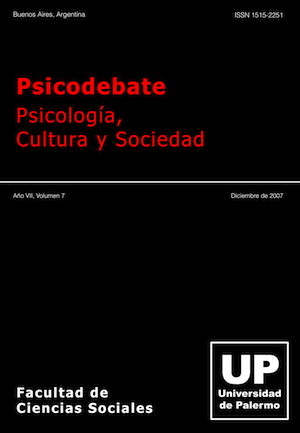Las razones para perdonar. Concepciones populares o teorías implícitas
Resumen
Se presentan datos obtenidos sobre la base del análisis de respuestas dadas por sujetos adolescentes y adultos de población general residentes en la ciudad de Buenos Aires y el conurbano bonaerense, personas privadas de libertad por hacer cometido un delito y estudiantes de teología cristiana. a las preguntas ¿Es importante para Ud. poder perdonar? Si. NO. ¿Por qué? (N total: 1715). Los datos analizados permiten afirmar que gran parte de la población general urbana considera que poder perdonar es importante. También para quienes han elegido estudios teológicos el perdón se revela como tema central del pensamiento cristiano: es un deber ser, asociado con el rol sacerdotal que se ha elegido ejercer. Esta dimensión religiosa aparece también entre las personas encarceladas que participaron del estudio: el ser creyentes es una de las razones para perdonar. Como ya se ha señalado en el texto, en esta muestra masculina perdonar está asociado con querer al otro: se perdona por amor. Entre las personas más jóvenes de la población el perdón se vincula con tener una segunda oportunidad frente a la equivocación así como con lograr paz interior. En términos globales, los hombres perdonan para olvidar y seguir hacia adelante y mejorar la convivencia social, mientras que las mujeres tienden más a reconocer que hay que perdonar para poder ser perdonados y consideran el poder hacerlo un indicador de inteligencia.
Descargas
Citas
Casullo, M.M. (2005). La capacidad de perdonar desde una perspectiva psicológica. Revista de Psicología, PUCP, 23, 39-64.
Coyle, C.T., & Enright, R.D. (1997). Forgiveness intervention with post abortion men. Journal of Consulting and Clinical Psychology, 65, 1042-1046.
Freedman, S.R., & Enright, R.D. (1996). Forgiveness as an intervention goal with incest survivors. Journal of Consulting and Clinical Psychology, 64, 983-992.
Hargrave,T. H., & Sells, J.N. (1997).The development of a forgiveness scale. Journal of
Marital and Family Therapy, 23, (1), 41-62.
Kaminer, D., Stein., D., Abanga, I., & Zungu-Dirwayi, N. (2000). Forgiveness: Toward an integration of theoretical models. Psychiatry, 63, (4), 344-357.
Lawler, K.A., Younger, J.W., Piferi, R.L., Billington E. (2003).Psychophysiology of forgiveness. Journal of Behavioral Medicine, 26, 373-393.
Mauger, P.A., Perry, J.E., Freeman, T., Grove, D.C., & McKinney, K.E. (1992). The measurement of forgiveness. Preliminary research. Journal of Psychology and Christianity, 11, 170-180.
Muñoz Sastre, M.T.; Vinsonneau, G.; Chabrol, H. & Mollet, E. (2005). Forgivingness and the paranoid style. Personality and Individual Differences, 38, 765-772.
Younger, J.W., Piferi, R.L., & Lawler, K.A. ( 2005). Dimensions of forgiveness The views of laypersons. Psychology Department. University of Tennessee. 1-15.
Witvliet, C., Ludwig, T.E., & Van der Laan, K. (2001). Granting forgiveness or harboring grudges: Implications for emotion, physiology and health. Psychological Science, 12, (2), 117 -123.
Los autores/as que publiquen en esta revista ceden los derechos de autor y de publicación a Psicodebate y aceptan el registro de su trabajo bajo una licencia de atribución de Creative Commons, que permite a terceros utilizar lo publicado siempre que de el crédito pertinente a los autores y a Psicodebate

















